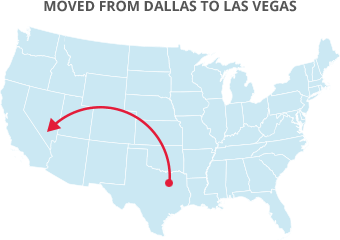

By Julie DeLong, A-1 Freeman Moving Group
 Moving to a new state? You are not alone--last year over 3 million Americans moved to a new home. Some of those moves were across the country and others may have been across town, but each of those families had to uproot everything they owned, load it onto a moving truck, and hope for the best. If you're contemplating a move, there's no question you've been researching moving companies and have gone down the road of horrible move anecdotes on review sites. How do you manage your residential move so that you are not duped by moving fraud, and that your belongings arrive at your new residence in Dallas safe and sound?
Moving to a new state? You are not alone--last year over 3 million Americans moved to a new home. Some of those moves were across the country and others may have been across town, but each of those families had to uproot everything they owned, load it onto a moving truck, and hope for the best. If you're contemplating a move, there's no question you've been researching moving companies and have gone down the road of horrible move anecdotes on review sites. How do you manage your residential move so that you are not duped by moving fraud, and that your belongings arrive at your new residence in Dallas safe and sound?The first thing to do is to learn the vernacular of the trucking industry. It's a lot easier to make sound decisions if you grasp the vocabulary of the business and the various business models of moving companies. This glossary of terms, found on the Federal Motor Carrier Safety Administration website, can assist you to familiarize yourself with Mover-talk so that when you hear phrases like storage-in-transit, accessorial charge and linehaul, you’ll comprehend what they refer to.
The FMCSA website is a terrific beginning point in general, as it also depicts the rules of the road, if you will, that motor carriers abide by. Any transportation provider you are pondering must be registered with the US Department of Transportation, and have a Motor Carrier and DOT number. You can view any grievances against a company on that site. The ones on Yelp and Google are more amusing, but any issues filed with the DOT usually have a higher level of truth than complaints that are probably the result of the customer just not paying attention.
In an ideal world, you'd employ movers a few months ahead of time, and unhurriedly pack, take care of the family, and be totally prepared when the moving van shows up. Reality is not so tidy, and that is what moving scammers rely on when they're promising you the moon—you're busy and worrying about a hundred things, so they appeal to your sense of urgency—here is a rough estimate and a handshake and we will talk about the paperwork later. This is a definite way to never see your stuff again, unless you want to buy it back off of Craigslist.
Instead, ask your realtor for a name of a moving company. Or, if you are acquaintances with anyone who has moved in the recent past, ask them for recommendations. National moving companies normally have locations all over the country, so you can ask your cousin in Iowa who they used, even if you live in Connecticut. Use the FMCSA website to search companies registered for interstate moves, and Google them. Once you've reduced down the list to a couple options, obtain written in-home estimates.
Make sure to review the FMCSA publication, "Your Rights and Responsibilities When You Move". When hiring a professional mover, it is a federal law that you're supplied with this 25-page pamphlet (or a link to it) that spells out your rights, protection, and industry regulations.
It is important that you spot a rogue mover BEFORE they have your belongings. Keep in mind, not every mover has your best interest in mind. So, keep these RED FLAGS on hand as you are interviewing your potential mover.
Be wary of movers who:
It's better to be safe than sorry. So, make sure and check out your moving company before they load your belongings onto their truck! Remember that if it seems too good to be true it probably is, and since you are trusting the moving company with what is effectively your life, do your research and pick a reputable moving company, like A-1 Freeman Moving Group, who will take good care of you when you move to Dallas.

